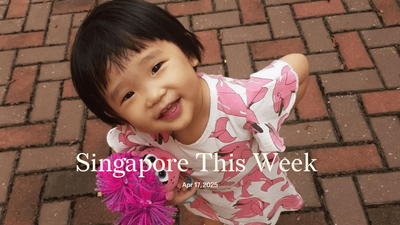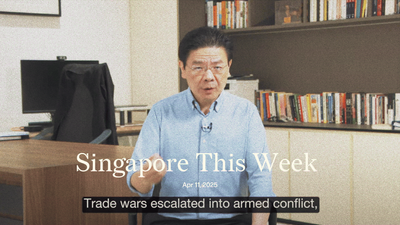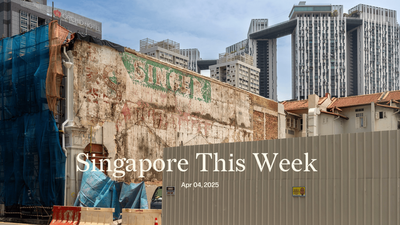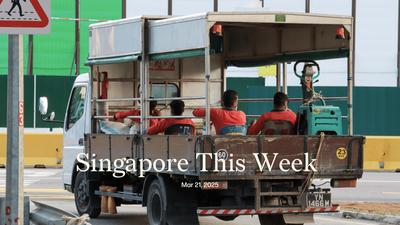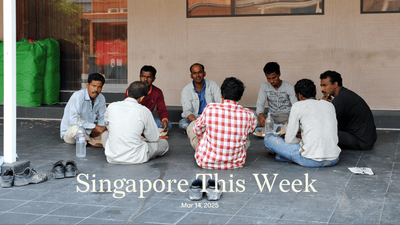Politics: Ever the diplomat
Lawrence Wong, deputy prime minister and presumed next leader of the ruling People’s Action Party (PAP), gave an interview to John Micklethwait, Bloomberg News editor-in-chief. Lots of ground was covered, from Nancy Pelosi to wealth taxes, though we learned little new about Wong, who for the most part articulated PAP talking points. He declined to share his own view on the criminalisation of sex between men, but said that the government is “...in the midst of discussing and engaging different parties on this.” On race, he said that he would welcome a future non-Chinese prime minister because “we choose our leaders on the basis of merit.” (Take that, Tharman.) Singaporeans have long taken pride in their leaders’ ability to navigate prickly interviews with Western outfits. Lee Kuan Yew could be acerbic, Lee Hsien Loong scholarly, and Wong, by this evidence, perhaps a deflector. “You are very good at the diplomatic answer,” Micklethwait said.
Politics: Pandemic opportunities
In early 2020, as the SARS-CoV-2 virus had just begun spreading from Wuhan, some in the PAP sniffed an opportunity to capitalise on the electorate’s fear to hold an early election—it happened that July, some nine months before it was due. Barely two years later, some suggest that the PAP should this time capitalise on the post-lockdown bonhomie to hold another one, perhaps next year. This view was boosted last week by findings from a Pew Research Center pandemic survey. Almost three-quarters of Singaporean respondents said that the government effectively handled the coronavirus outbreak “in ways that show the strengths of the political system”, a far higher share than in any of the other 18 countries polled. Pew’s sample, however, did not include any of the 300,000 odd migrant workers who’ve just endured the world’s longest lockdown. Lucky for the PAP, they have no vote.
Society: Retail therapy
Some 19,000 low-wage retail workers will see their monthly salaries increase 8.4-8.5 percent annually over the next three years. A full-time cashier will see an increase from a minimum of S$1,850 in September this year to S$2,175 in 2024. Few open economies enjoy such reliable wage predictions, though few have anything as deliberate as Singapore’s Progressive Wage Model (PWM), which ties wage increases to the upgrading of skills. The PWM is often seen as a sop by a market-oriented government to those wanting a proper minimum wage. Critics say the PWM works too slowly, is not well enforced, and it hurts job mobility, because benefits are often linked to sector and employer—employees are afraid to move. A 2021 report by the Lee Kuan Yew School of Public Policy (LKYSPP) found that S$2,906 is a reasonable living wage for each adult in a two-parent, two-child household. Retail workers may need stronger therapy.
Society: Seeking shelter
There are 1,036 homeless people in Singapore, a seven percent drop from the first and last count in 2019, according to new research by the same team at the LKYSPP. Researchers found the highest number in the city state’s downtown area. The big shift over the pandemic period has been from the streets to shelters. While 616 people, a 41 percent drop from 2019, are bunking in public spaces, those in temporary shelters rose from 65 to 420. This is partly due to outreach by government agencies and volunteers, and also concerns about health and safety, during the pandemic. The new homeless included those who lost their jobs after Covid-19 struck, and those who had to leave the safety of friends’ or relatives’ homes, due to tightened social distancing measures. Singapore’s homelessness rate is below that of South Korea and Taipei, though still well above the world’s leader, Bhutan (zero, apparently). What we must cheer are the tireless efforts of the team led by Ng Kok Hoe at LKYSPP’s social inclusion project. Finally, Singapore is consistently measuring homelessness, something long claimed to be non-existent.
Society: Seeking tax shelter
By 2030, over 13 percent of Singaporean citizens and permanent residents will be millionaires, a greater share than in China, the US, and every other country in the Asia-Pacific region, according to HSBC. This new report comes in the same week that Tommy Koh, ambassador-at-large, called Singapore a “very snobbish and hierarchical society”, one “ruled by money”. Koh said that Singapore had failed to achieve one of Lee Kuan Yew’s objectives: the creation of a society with few poor, few rich, and a very large middle. If HSBC is to be believed, Koh may have to brace himself for even more snobs.
Society: Kurang manis
The Ministry of Health and its Health Promotion Board, which have been on a killjoy warpath for the past few years—counting calories in your pineapple tarts and much else—now have their sights trained on your teh tarik. By the end of 2023, the Nutri-Grade label will extend to freshly prepared beverages high in sugar and saturated fat, including coffee, fruit juice and bubble tea. This will initially apply only to larger establishments, good news for the coffee shop aunties and uncles. Outlets are expected to include an A-D grading by each drink on their menu. Those that earn the unhealthiest D badge will have advertising restrictions. (Akin to cigarettes?) The Health Promotion Board has reassured establishments that they won’t need to be laboratory-precise about how they arrive at these ratings. For those who don’t like to have their conscience pricked with reminders of how unhealthy their diet is, these measures might come across a little naggy. But supporters of the scheme insist that it will educate consumers and help them make healthier choices. Diabetes is a weighty problem in Singapore. It costs the state S$1b a year to manage, with one in three people at risk of developing the disease in their lifetime.
Internet culture: No tea spilled
"T42", a popular podcast about life in Singapore, is back online after previously pulling all of its episodes from Spotify. Host Joel Tan made an Instagram post in June alluding to outside forces demanding their silence. While skirting any specifics, he tagged the Ministry of Education in the post. The post attracted over 900 likes and hundreds of comments. Listeners and many others perceived it as yet another assault on independent media and genuine, bottom-up dialogue. In their latest episode, Joel and his co-host Kishan K Singh fill in some of the gaps: an anonymous complaint, offence taken at supposed “homosexual content”, and Kishan’s job as a schoolteacher. The podcast’s swift reinstatement suggests that an overly zealous censor might have overplayed their hand, only to face a rebuke from dissenters within the system, themselves wary of a potential popular backlash.
Arts: SeptFest returns
Following a very public departure from Armenian Street and a subsequent board reshuffle, The Substation is staging a return to its flagship programme, SeptFest. The now-itinerant Sub has not announced any plans to relocate to a new building so this year’s programme will be held in various locations as well as the pandemic mainstay, online. Titled "uproot | rootless", SeptFest 2022 runs for the entire month of September. Audiences can expect a variety of genres and art forms from both emerging and established artists, true to the diversity for which the Armenian Street venue was known. Highlights include “The Death Of Singapore Theatre As Scripted By The Infocomm Media Development Authority Of Singapore”, a performance lecture written by Alfian Sa'at, to be performed by Farah Ong at 72-13 Mohamed Sultan Road, and "Mixtape vol 32 - Side A & Side B”, a two-part online music presentation on The Substation's website and YouTube channel.
History Weekly by Faris Joraimi
The recent stabbing of novelist Salman Rushdie in New York state has reopened old wounds. When the controversy first erupted in 1988 about Rushdie’s novel The Satanic Verses, Singapore’s Muslim minority had to again balance its relationship with its global faith community and a secular national context. Our Malay press spoke forcefully on the matter. The right of free expression did not preclude “responsible limits,” went one editorial. Another highlighted Rushdie’s supposed “arrogance”. Yet other reports acknowledged the diversity of reactions even within the Islamic world’s seemingly united disapproval. For example, the Iranian Ayatollah’s decree to “send him to hell” differed from Meccan theologians’ suggestion of legal consequences. Responses were indeed complex, with the Selangor Chief Minister urging Muslim intellectuals to meet “blasphemy” through knowledge instead of aggression. Ultimately, the Singapore Malay press advocated a “rational protest”: more dialogue, less emotions. Rushdie, one article claimed, was not the first to misrepresent or ridicule Islam, and certainly wouldn't be the last. In February that year MUIS, Singapore’s highest Islamic body, urged a ban of the book after having “studied” it, concluding that it is “insulting” to Islam. The government took it off shelves the following month, along with another book thought controversial: Nikos Kazantzakis’s The Last Temptation published in 1955. In response S. Rajaratnam, a former journalist and deputy prime minister, took aim at the Singaporean censors’ overwhelming interest in books potentially offensive to Christians. It makes for an amusing read.
Tech: Under the Sea
Sea, the parent company of gaming company Garena and e-commerce company Shopee, announced lacklustre Q2 results with a net loss 77 percent greater than a year ago. Gaming and e-commerce, which experienced significant growth during the pandemic, are now having a post-opening-up hangover, amid rising inflation and interest rates. Sea’s lacklustre performance was driven by a US$100m (S$138.1m) decrease in revenue from its gaming business and a US$177m (S$244.5m) impairment from lower valuations of prior acquisitions, as well as share-based compensation. Despite the poor performance, the e-commerce unit reported improved unit economics and revenues, possibly from the reduced subsidies on orders. The bright spot for Sea seems to be in the money. Its newly launched financial services arm has reported stellar growth, with revenue up over 200 percent and losses down almost 30 percent from the year before.
Tech: Instant gratification
Atome Financial secured a US$100M (S$138.1 million) debt facility from HSBC bank. The subsidiary of Singapore unicorn Advance Intelligence Group currently provides consumers across South-east Asia with 0 percent interest rates on three monthly instalments for their purchases at any of their 15,000 retail partners such as Shein, Sephora and Charles & Keith. The announcement comes at a time of rising interest rates and increasing criticism over how buy-now-pay-later (BNPL) providers encourage excessive consumerism and overspending amongst the youth and demographics which cannot afford to finance their purchases. Nonetheless, BNPL can also be helpful for consumers who occasionally need to finance big ticket purchases and want to avoid the high interest rates on credit cards and loans. Consumer financing, when done prudently, is a powerful way to allow individuals to engage in consumption smoothing over the course of their lives.
Business: Tapping out
ONE Championship, the Singapore-based MMA unicorn, announced that it is shifting its headquarters from Singapore to the Cayman Islands, ahead of a US IPO. Chatri Sityodong, its founder and CEO, previously stated his gratitude to the Singapore Government, without which ONE “would not have had any chance to become a unicorn.” While the operational implications of the relocation are unclear, the tax benefits are. Grab did this as well ahead of its own IPO. The MMA firm was last valued at US$1.2bn (S$1.6bn) after raising US$174m (S$238.9m) last December from Guggenheim Investments and Qatar Investment Authority. It stated then that it was looking at a listing via a special purpose acquisition company (SPAC). However, given the poor performance of SPAC listings thus far, it is understandable that ONE is now keen on a traditional IPO.
If you enjoy Jom’s work, do get a paid subscription today to support independent journalism in Singapore.


